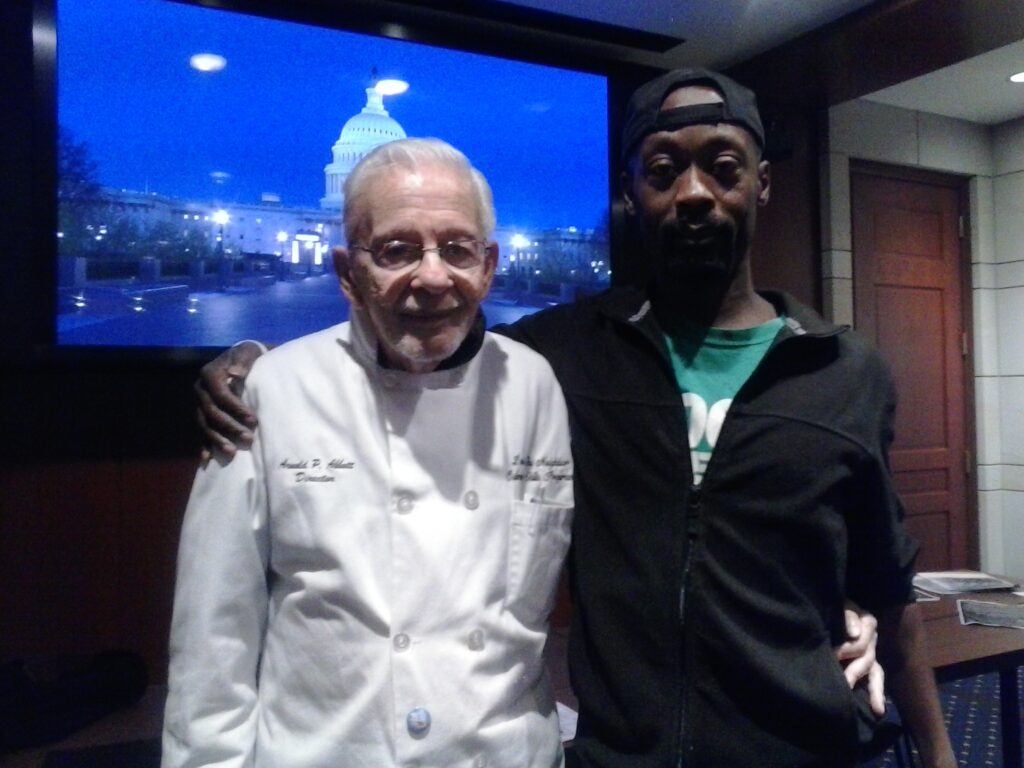Arnold Abbott spent 23 years feeding homeless people every Wednesday at Fort Lauderdale, in a South Florida park. On November 2, 2014, at age 90, the city would arrest him for it. Abbott later told reporters that an officer said, “Drop that plate right now,” as if he were holding a weapon.
The World War II veteran refused to stop. Police charged him, and he faced jail time, but the story went national. His defiance challenged Fort Lauderdale’s attempt to criminalize compassion and made him a symbol of what happens when doing the right thing becomes illegal.
From Maureen’s Memory to a Lifelong Calling
Arnold Abbott and his wife, Maureen, started feeding homeless people together in 1979. They’d cook meals and bring them to the beach. When Maureen died in 1991, Abbott founded Love Thy Neighbor Fund in her memory. He was 67 years old, a World War II veteran, and a retired jewelry salesman who turned this into his full-time mission. What he and Maureen had started together became his entire life.
Every Wednesday, Abbott and volunteers prepared home-cooked meals and served them at Fort Lauderdale Beach. Hundreds came, and for many, it was their only hot meal.
Abbott built more than a feeding program. He created a culinary training school that graduated over 400 formerly homeless men and women with Food Safe and Chef’s Certificates. His motto was “Give A Hand Up, Not A Hand Out.”
People would call him Chef Arnold. At 90 years old, he still served food and spoke to everyone who came through the line. He offered kind words along with the meals. He treated each person as someone worth caring about..
The Day Feeding the Hungry Became Against the Law
In October 2014, Fort Lauderdale passed a law targeting public feedings. Sites had to be 500ft apart, 500ft from homes, one per block. Groups needed portable toilets. The city called it a regulation. Abbott saw through it. The rules weren’t about sanitation or public safety but about pushing homeless people out of Fort Lauderdale.
Mayor Jack Seiler defended the law to the Sun Sentinel. He said he wasn’t satisfied with having a cycle of homelessness in the city. He wanted Abbott to feed people indoors. But homeless people don’t live indoors.
Abbott had fought this before. In 1999, Fort Lauderdale banned him from feeding people on the beach. He sued and won. Fifteen years later, the city tried again with different rules but the same goal. Police stopped Abbott on November 2 after he had handed out just four plates. They charged him and two pastors, CNN reported. Each faced 60 days in jail and a $500 fine.
Abbott came back the next Wednesday, and the police charged him again, then again the Wednesday after. Three charges in less than two weeks. He kept coming with food, his rights from the first court battle, and he knew his duty. He told reporters, “These are the poorest of the poor. They have nothing. They don’t have a roof over their head. Who can turn them away?
He wouldn’t.
How a 90-Year-Old Veteran Stood His Ground
Arnold Abbott’s arrests made national news. The outrage was immediate when people saw a 90-year-old World War II veteran cited for feeding hungry people. Abbott refused to back down. “I am my brother’s keeper,” he told the media, and the phrase became his rallying cry. He told the Sun Sentinel he would continue “as long as there is breath in my body” and threatened to sue the city again. Later on, other advocates joined him. People set up feeding stations outside the city hall. Civil disobedience spread through Fort Lauderdale.
The mayor had wanted to end what he called the cycle of homelessness by moving services indoors and out of sight. Instead, Fort Lauderdale became known worldwide for arresting a 90-year-old man who fed hungry people.

The legal battle stretched on through 2014 and into 2015. However, in December 2014, a Florida circuit court judge temporarily halted the law, and the courts sided with Abbott. He could finally continue his work without fear of arrest, just as he had after his 1999 victory.
Abbott made sure to keep his promise. Every Wednesday for another five years, he showed up at Fort Lauderdale Beach with hot meals. He continued even as donations to Love Thy Neighbor ran low, and after discovering that two assistants had stolen from the organization. The work mattered more than the obstacles.
Arnold Abbott died on February 22, 2019. He was 94 years old.
Read More: California Couple ‘Adopts’ 93-Year-Old Veteran After His Town Burned to the Ground
What Chef Arnold Left Behind
Fort Lauderdale Mayor Dean Trantalis said in a statement after his death that Abbott was “a courageous individual and a champion for the underserved.” His generosity left a mark on the city that had tried so hard to stop him.
Abbott’s fight went beyond Fort Lauderdale. He proved that when laws target the vulnerable, someone has to stand up. He’d beaten the city once in court in 1999. He knew his rights. He knew that fighting in court takes time, and hungry people can’t wait for judges to decide if feeding them should be legal. So he kept serving meals and let the courts catch up.
Years after his death, Abbott’s story keeps finding new audiences. People share it because they see what he saw. Feeding someone who’s hungry isn’t wrong, no matter what the law says. Abbott chose people over permits. He couldn’t turn them away. And we’re better for it.
Read More: Highschool students build tiny homes to help homeless veterans

